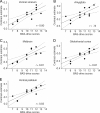Individual differences in reward drive predict neural responses to images of food
- PMID: 16687507
- PMCID: PMC6674259
- DOI: 10.1523/JNEUROSCI.0350-06.2006
Individual differences in reward drive predict neural responses to images of food
Abstract
A network of interconnected brain regions, including orbitofrontal, ventral striatal, amygdala, and midbrain areas, has been widely implicated in a number of aspects of food reward. However, in humans, sensitivity to reward can vary significantly from one person to the next. Individuals high in this trait experience more frequent and intense food cravings and are more likely to be overweight or develop eating disorders associated with excessive food intake. Using functional magnetic resonance imaging, we report that individual variation in trait reward sensitivity (as measured by the Behavioral Activation Scale) is highly correlated with activation to images of appetizing foods (e.g., chocolate cake, pizza) in a fronto-striatal-amygdala-midbrain network. Our findings demonstrate that there is considerable personality-linked variability in the neural response to food cues in healthy participants and provide important insight into the neurobiological factors underlying vulnerability to certain eating problems (e.g., hyperphagic obesity).
Figures



Comment in
-
Personality predicts responsivity of the brain reward system.J Neurosci. 2006 Jul 26;26(30):7775-6. doi: 10.1523/jneurosci.2377-06.2006. J Neurosci. 2006. PMID: 16871685 Free PMC article. No abstract available.
References
-
- Abelson P, Kennedy D (2004). The obesity epidemic. Science 304:1413. - PubMed
-
- Anderson AK, Christoff K, Stappen I, Panitz D, Ghahremani DG, Glover G, Gabrieli JDE, Sobel N (2003). Dissociated neural representations of intensity and valence in human olfaction. Nat Neurosci 6:196–202. - PubMed
-
- Balleine BW (2005). Neural bases of food-seeking: affect, arousal and reward in corticostriatolimbic circuits. Physiol Behav 86:717–730. - PubMed
-
- Bassareo V, Di Chiara G (1999). Modulation of feeding-induced activation of mesolimbic dopamine transmission by appetitive stimuli and its relation to motivational state. Eur J Neurosci 11:4389–4397. - PubMed
-
- Becerra L, Breiter HC, Wise R, Gonzalez RG, Borsook D (2001). Reward circuitry activation by noxious thermal stimuli. Neuron 32:927–946. - PubMed
Publication types
MeSH terms
Grants and funding
LinkOut - more resources
Full Text Sources
Other Literature Sources
Medical
